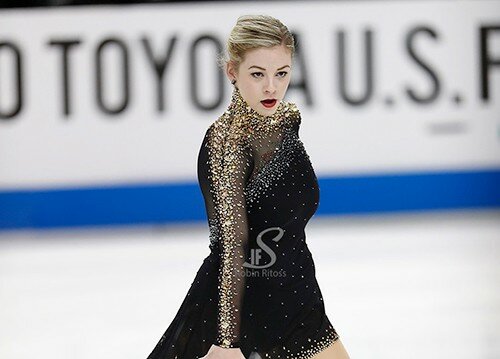

When Gracie Gold arrived in Greensboro, North Carolina for the 2020 U.S. Championships, nobody — including herself — knew what to expect. It had been three years since the former two-time champion had competed at the national level, and she had been to hell and back in the interim.
Gold’s journey back to the U.S. Championships has been one of grit and determination. Her well-publicized battle with mental health issues and an eating disorder dominated the news for a long time, and it seemed her once promising career had come to an end.
Her 12th-place finish in Greensboro was irrelevant in the grand scheme of things. Just to have made it back to the national stage was accomplishment enough for the 24-year-old.
At one point, Gold felt that returning to competition was unattainable and recalled thinking “we’re just going to have to pull the plug on this operation.” Mentally she had moved on. Her skating gear and costumes had been shipped home, and Gold had accepted full-time employment as a coach at a rink in Scottsdale, Arizona.
But after attending the 2018 U.S. Championships as a spectator, Gold had a change of heart. “I was watching the junior ladies competition in front of a curtain with some officials. I was not ready to be out in front of that curtain because I didn’t want people to see me,” Gold recalled. “Then one of the officials said, ‘I want you to meet someone,’ and pulled Vincent (Restencourt) and Pasha (Filchenkov) from behind the curtain.
“After we were introduced, the official said she thought I should go and work at their rink. I was like, ‘Yeah, great,’ and stood there for an awkward second.” The trio ultimately traded contact information. When Gold paid a visit to their rink on the outskirts of Philadelphia, they pitched the idea of her returning to competitive skating. She decided to give it a try.
Gold understood she would have to work on her fitness and, given her prior unhealthy relationship with food, also knew she had to be smart about how she approached that aspect of her comeback. “I thoroughly enjoyed my retirement. I was very out of shape and this was documented by photographic evidence. I was not in shape to be an athlete let alone a figure skater,” Gold explained. “That part was tricky because it required the most patience. There’s no magic formula for weight loss. Someone would have found it already if there were. It’s just day in and day out. You can’t be too crazy, and you can’t be too gentle because either way it can lead down a different road than the one you want to take.
“It was hard at first, but once I got into a consistent rhythm and I was hitting my stride and could get some traction — good days, good weeks, good months — the progress really started to show. I don’t weigh myself anymore because that was even more of a thing then — how I actually looked or felt. I don’t get into those numbers because that’s really none of my business.”
In the late spring of 2018, Gold began off-ice workouts and began lifting weights. “That is a little off-brand because I don’t look like I would be into that but I got super into leg day and back day,” she said. “I was even in the squat rack — a part of the gym that I had never really ventured into before. I was really strong, but the look really wasn’t streamlined for skating. Muscles are heavy and although I could do a short program run through, I started to wear down as the day progressed. So, we made a shift in how I trained. We kept grinding on with the programs and we kept up with cardio, but shifted more into plyometrics in the weight room.”
Once a solid routine was in place, Gold began to notice things were changing for her on the ice. Because her body was responding so quickly to her training regime, she admitted that finding the necessary sweet spot was tricky. “It was the combination of being lighter but stronger,” she explained. “If I threw a bowling ball, suddenly my arm got stronger and then I tried to throw a softball. It was kind of like that.
“Back in April, it was very stressful for me to do a triple toe in a two-minute ice show. I didn’t even do a double Axel because I was not that courageous yet. All of a sudden I am doing quads in the pole harness, and the goal then became qualifying for nationals. That quickly evolved into skating well at nationals with a triple-triple.
“The bar kind of went up so fast that I couldn’t really get a grip on what was realistic and what was not. As I lost weight but got stronger my timing kept changing, and it felt like every two or three weeks I was in a new body. That was not a bad thing, but it was an adjustment period.”
Gold had to work her way through the qualifying system to earn a ticket to Greensboro. Her performance at the South Atlantic Regional Championships was good enough to advance to Eastern Sectionals in November. She finished in third place there and earned one of the four berths available at the 2020 U.S. Championships.
She and Restencourt parted ways in the fall, but Gold said it was a seamless transition because she had been working with Filchenkov and Alex Zahradnicek almost full time.
Gold turned to her 2014 Olympic teammate, Jeremy Abbott, to help choreograph her programs. He selected the Annie Lennox version of “I Put A Spell on You” for the short program, and Sara Bareilles’s “She Used to Be Mine” (from the Broadway musical “Waitress”) proved to be the perfect choice for Gold’s return to competitive ice. “When Jeremy and I first heard this music, we knew that it was it. I don’t think we even listened to other music. Once we heard this, we knew that this was the piece, no questions asked,” Gold said. “The lyrics really hit home in so many ways, and we choreographed it before I had seen the show because I knew that the way it is portrayed in the musical was not my story. We didn’t want that story to infringe on our moment.”
At the close of her long program in Greensboro, the audience rose to its feet in a standing ovation while Gold dropped to the ice on one knee, taking a few moments to reflect on what she had just accomplished. “I felt a mix of things. Like with all competitions, I felt a bit of relief, to be honest. I was excited but I was relieved. Really truly, I was almost overwhelmed that I was very much existing in the moment because I could not exist anywhere else.
“It felt really important to me because that doesn’t happen so often in skating. I think that’s also why it meant a lot,” said Gold of the standing ovation. “I’m not from Greensboro, I don’t have any ties with this area, and I’ve never won here. I hadn’t skated well anytime that I had been here, so the fact that all those people gave me a standing ovation for a program … the elements did not ask for it, but the moment asked for it. It’s one of those moments that is bigger than you.”
Gold said she plans to continue competing for at least one more year and has “bought in for at least an off-season and the summer. Obviously, in the dream world everything keeps getting better and I have these amazing programs and end up doing some internationals. Maybe the Grand Prix, or maybe I’m on the national podium and go to the World Championships or World Team event. These are all things that would build me back to the very top elite level.”
But she is quick to temper those expectations, pointing out it was miraculous that she has made it this far. “In October it was a feat that I landed a plain triple Lutz in my program at regionals. That was a huge accomplishment. And now the expectations have gotten so much bigger,” she said. “We’re trying not to get too far ahead of our skis and focusing on things like the 2022 Olympic Games or winning nationals again.
“Those are all of our ultimate goals, but I have a tendency to dream too big too fast. I have no patience for anything at all, which is cool because I demand things now. Sometimes I get them, but occasionally run into issues. Those are the goals, but to get there we just have to keep laying each building block so that we can construct the whole building.”
Gold will leave the music selections to Abbott for next season. “I’m not great at creating things. I can copy and learn, but it’s not in my nature like it is in Jeremy’s,” she explained. “Creative artists can hear a piece of music, watch you stroke around the rink, and just put two and two together. I leave that part to the creative genius.
“Moving forward, it will be very different in terms of how we select music because we’ve already told the story. There are only so many songs that are like ‘She Used to Be Mine’ and we don’t want to be beating a dead horse. If I oversaturate everything that I’ve done with my mental health or if I only share the dark stuff, it’s a lot of emotion. I’m excited to work with Jeremy to explore new options because he is a very creative, artistic soul.”
For Gold, the beauty in all of this was not knowing where she was going to end up. “I didn’t need to know. I just needed time to see where my second chance would lead me.”
(Originally published in the IFS April 2020 issue)




